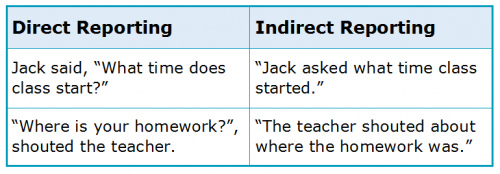Why are reporting verbs important in academia?

This is the first of three chapters about Reporting Verbs. To complete this reader, read each chapter carefully and then unlock and complete our materials to check your understanding.
– Introduce the concept of reporting language
– Highlight the usefulness of such language in academia
– Provide examples of reporting verbs and phrases
Before you begin reading...
-
video and audio texts
-
knowledge checks and quizzes
-
skills practices, tasks and assignments
Chapter 1
It’s important when studying the English language that you’re able to fully grasp how to report the speech of others. It’s quite possible that during general English classes in the past you were introduced to basic reporting language, such as the direct and indirect reported speech examples provided below:

You may now be wondering how this kind of language, which uses reporting verbs such as ‘say’, ‘tell’ and ‘ask’, might be useful at a higher, more academic, level. If you’ve already begun studying at an English-speaking university, then you should be familiar with the importance of including a mixture of writer’s voice and source voice in your research and assignment. What this means is that it’s not enough for a student to simply write an idea, but that student must also introduce other authors’ source research to support or further explain their claims and arguments.
Simply put, source voice is when we use integral or non-integral citations to introduce the voices and research of other authors in our own assignments. By looking at the examples below, we can see that the integral citation type in the right column requires particular language to introduce the source (Jones, 2019):

The verb ‘show’ that’s been used with the integral citation in this example is called a reporting verb. There are many different types of reporting verb for a writer to select, each with their own slightly varying meaning and grammar. Reporting verbs such as ‘show’, ‘claim’ and ‘argue’ are generally used to report or discuss another author’s findings within our own research or assignment. Because university students are required provide their own opinion about a topic or evaluate a concept or theory, it’s important that such students are able to utilise reporting language to introduce sources which support their ideas.
Provided below are some example sentences which demonstrate that it’s not only reporting verbs but also reporting phrases that you may be required to learn and confidently use in your academic writing. Note that although these phrases can often use the same reporting verbs, reporting phrases tend to precede the citation.
1. Examples of Reporting Verbs
a)“Smith and Lee (2016) state that having a knowledge of reporting verbs greatly increases the likelihood of success at university.”
b)“Jones et al. (2004) claimed that reporting verbs were an unnecessary distraction for preliminary-year students.”
c)“Huang (2019) discusses whether reporting verbs should be taught to undergraduate students at all.”
2. Examples of Reporting Phrases
a)“According to Smith and Lee (2016), having a knowledge of reporting verbs greatly increases the likelihood of success at university.”
b)“As was claimed by Jones et al. (2004), reporting verbs are an unnecessary distraction for preliminary-year students.”
c)“As discussed in Huang’s (2019) investigation, reporting verbs should perhaps not be taught to undergraduate students at all.”
What can be seen in the above examples (which will be discussed in more detail in Chapters 2-3) is that it’s critical as a writer to not only understand the meaning of the reporting language you’re using, but to also have a sufficient knowledge of how to alter the tense, syntax and pre– and post-modification of these verbs and phrases.
To reference this reader:
Academic Marker (2022) Reporting Verbs. Available at: https://academicmarker.com/academic-guidance/vocabulary/reporting-verbs/ (Accessed: Date Month Year).
Downloadables
Once you’ve completed all three chapters about reporting verbs, you might also wish to download our beginner, intermediate and advanced worksheets to test your progress or print for your students. These professional PDF worksheets can be easily accessed for only a few Academic Marks.
Collect Academic Marks
-
100 Marks for joining
-
25 Marks for daily e-learning
-
100-200 for feedback/testimonials
-
100-500 for referring your colleages/friends